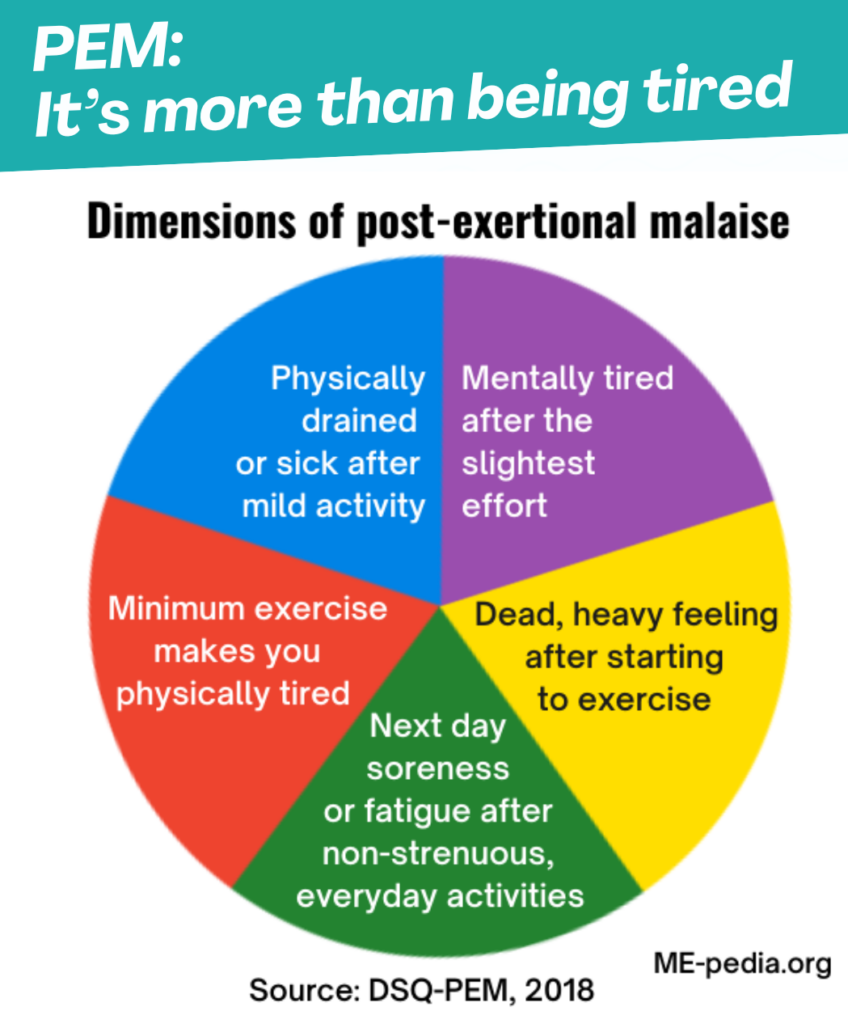We can’t talk about Long COVID without talking about ME.
ME is Myalgic Encephalomyelitis and studies show it may affect 50% of people with Long COVID.
What is ME? Resource sheet
Our Long COVID Essentials series includes several sheets related to ME, including:
- What is Myalgic Encephalomyeliitis (ME/CFS)?
- Severe ME
- Fatigue and post-exertional malaise
- Why you should be careful about activity & exercise after COVID
Visit the Long COVID Essentials homepage for additional resources. This series have been reviewed by leading medical experts and are useful for patients, caregivers, and medical providers. Spanish translations are currently being produced.
ME: The Basics
- A complex chronic disease, with many different symptoms that can come and go and/or be ongoing.
- Most ME cases begin after an infection, though genetics and life experiences may also play a role.
- Can range from mild to very severe.
- Can include five different kinds of fatigue: Post-Exertional, Wired/Tired, Brain Fog, Lack of Energy, and Flu-Like Fatigue.
- Cardinal symptom is Post-Exertional Malaise (PEM): a flare-up of symptoms happens after even minor physical, emotional or mental effort. Symptoms typically worsen 12-48 hours after activity, and can last for days or even weeks.
- People with ME experience a substantial loss of physical and/or cognitive function.
- ME is sometimes conflated with chronic fatigue syndrome (CFS). ME is a more specific term for the disease characterized by PEM, while CFS can refer to a less specific set of signs and symptoms that may not include PEM.

ME: The Numbers
- 75% of people with ME are unable to work.
- 25% are homebound / bedridden.
- 15-30 million people worldwide are living w/ ME.
- 80-90% of cases are undiagnosed.
- 75-85% of cases are in people assigned female at birth.
- The average person with ME scores as more disabled on quality of life surveys than those with multiple sclerosis, stroke, diabetes, renal failure, lung disease, heart failure, and cancer.
- Someone with mild ME may be able to work full-time with accommodations; someone with very severe ME may be bedbound and have trouble communicating.
Source: ME Action, learn more at www.meaction.net/learn/what-is-me
Common ME Symptoms
In addition to PEM, other common symptoms include:
- Unrefreshing sleep
- Orthostatic intolerance (symptoms occur when standing up, but clear up when sitting or lying down)
- Pain in the muscles and joints
- Headaches of a new type, pattern, or severity
- Cognitive symptoms such as confusion, difficulty retrieving words, poor working memory, spatial instability, and disorientation
- Sensitivity to light, sound, taste, odor, or touch
- Gastrointestinal symptoms (nausea, pain, etc)
- Effects on muscles: fatigue, weakness, twitching; poor coordination, loss of control (ataxia)
- Autonomic and endocrine symptoms (poor temperature regulation, cold or heat intolerance)
- Immune symptoms (tender lymph nodes, sore throats, fevers, or flu-like symptoms; new food or chemical sensitivities)
Source: ME Action, learn more at www.meaction.net/learn/what-is-me
“Karla Monterroso, a Los Angeles-based consultant and former CEO who has long COVID from a March 2020 infection, said that symptoms like fatigue and exercise intolerance play into racist stereotypes. ‘The stereotypes people have about Black, Indigenous, and Latine people are the exact presentation of illness of long COVID,’ she said. ‘[That] you’re lazy, you don’t want to work hard, you’re unhealthy … post-exertional malaise, brain fog, all of those symptoms replicate those stereotypes.’ According to Monterroso, she encountered a racist cardiologist who said, ‘I know you want to be in bed. Laying down is nice. But you gotta get up and get that body moving, entiende?’ she recounted in ‘The Long COVID Survival Guide.”
From The Long COVID nightmare is far from over, especially for women of color by Laura Weiss in Prism Reports
Resources
Treatment and clinical guidance for patients & providers
- Check out MEAction’s resources for diagnosis, treatment, finding providers, & much more. Plus they have ongoing education and advocacy campaigns:
- #Stop.Rest.Pace– Resources on pacing.
- #TeachME TreatMe– Campaign to educate clinicians and medical students about ME/CFS, including a Mayo Clinic education module (CME) for clinicians, a template for emailing your doctor and encouraging them to participate, and more.
- Pacing (activity management), resting, and medication can be helpful. Providers should work with patients on personalized care.
- Understanding connections between Long COVID and ME/CFS – ME Action
- Long Covid With ME: Resources on living with Long COVID and associated diseases like ME/CFS and postural tachycardia syndrome (POTS).
- ME-CFS Navigator: A resource for people with ME/CFS and people who think they might have it. Made by a patient, for patients, to help you navigate your experience, become better informed, and self-advocate with medical professionals.
- Tip: Some people with ME/CFS find wheelchairs to be very helpful, especially when out in the world, because they can help you raise your feet and get in a resting position. Search this page for “wheelchair” for more tips. (Use browser menu or keyboard shortcuts Ctrl+F (Windows, Linux, and Chrome OS) and ⌘+F (Mac) to bring up the “find” bar on the page.)
- Clinician resources including videos and more from Bateman-Horne Center.
- Highlights:
- Good Day, Bad Day Questionnaire
- Health Assessment Worksheet to bring to medical visits
- ME/CFS Crash Survival Guide
- Diagnostic and Treatment Guides
- Highlights:
- Patient-led resources, including videos in multiple languages, from Long COVID Physio.
- ME/CFS Clinical Coalition
Tips, support groups, advocacy
- #MEACTION
- MEAction organizes groups and campaigns, including: Facebook groups and monthly calls, organized by affinity, region, or relation to ME (patient, family, caregiver, and more.)
- WORLD ME ALLIANCE
- A global network with groups in over 20 countries: worldmealliance.org.
- CANARY CORPS
- MEAction‘s peer-run program to help people with ME, LC, and other infection-associated illnesses find & access local disability services and support. This is a new project currently under development.
- ADDITIONAL GROUPS
- Check out our Get Connected page for additional support and advocacy groups for ME, LC, and associated diseases.
Additional reading
- Fatigue Can Shatter a Person by Ed Yong: article, PDF, audio (read by the author!)
- Women of color face additional hurdles with Long COVID by Laura Weiss for PRISM Reports
